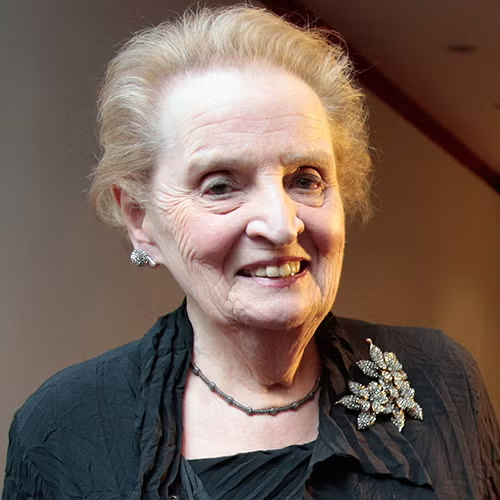
Table of Contents
Who Was Madeleine Albright?
Madeleine Albright was a distinguished American diplomat and the first woman to serve as Secretary of State, significantly shaping U.S. foreign policy in the late 20th century. After relocating to the United States as a child, she pursued higher education at Wellesley College and Columbia University. Albright’s political career was launched in 1993 when she became the U.S. ambassador to the United Nations, and three years later, she was appointed Secretary of State during the Clinton administration. Albright held this influential position until 2001, when she left to engage in various other professional pursuits.
Early Life
Born Marie Jana Korbel in Prague on May 15, 1937, Albright fled her homeland with her family shortly after the Nazi invasion at the onset of World War II. They initially settled in England, where they remained throughout the war. Raised as a Catholic, Albright later discovered her Jewish heritage; her parents had converted to Christianity, and three of her grandparents perished in concentration camps during the Holocaust. In 1948, following a brief return to Czechoslovakia, the Korbel family escaped once more, this time relocating to Denver, Colorado, as communists seized power. Her father, Josef Korbel, transitioned from a journalist and diplomat to a notable professor at the University of Denver, greatly influencing Albright’s understanding of global affairs.
Educational Achievements
Albright excelled academically, earning a scholarship to Wellesley College, where she became the editor of the college newspaper and developed her interest in politics. During a summer internship at the Denver Post, she met Joseph Albright, a publishing heir, and they married shortly after her graduation with honors in 1959. As Joseph pursued his journalism career, Albright raised their three daughters—twins Alice and Anne, born in 1961, and Katherine, born in 1967—while studying Russian and international relations. She completed her education at Columbia University, earning a certificate in Russian studies in 1968 and subsequently obtaining her M.A. and Ph.D. in public law and government in 1976.
Adviser and Educator
Albright entered the political realm as a legislative assistant to Senator Edmund Muskie in 1972. Four years later, she joined the National Security Council under National Security Adviser Zbigniew Brzezinski, one of her former professors. Following the Democratic loss of power in the early 1980s, she transitioned to the private sector, engaging with various Washington nonprofits and serving as a professor of international affairs at Georgetown University, where she received the Teacher of the Year Award four times. During this period, Albright divorced her husband after he left her for another woman. Despite this personal setback, she continued to thrive professionally, hosting gatherings that attracted Democratic leaders and positioning herself as a prominent voice in foreign policy. Notably, she advised Michael Dukakis during his 1988 presidential campaign.
Leader in World Affairs
In 1992, President Bill Clinton appointed Albright to oversee U.S. relations with the United Nations, officially assuming the role in January 1993. During her four years in this position, she emerged as a proponent of “assertive multilateralism,” emphasizing U.S. leadership in global politics. Albright actively advocated for increased U.S. military involvement in the Balkans amid the region’s conflicts in the 1990s and pushed for intervention during the Haitian coup in 1994.
In December 1996, Clinton nominated Albright as Secretary of State, making her the 64th individual to hold the position and the first woman to do so. She quickly established herself as a formidable problem-solver, addressing a wide array of issues, including promoting human rights and democracy worldwide, preventing the proliferation of nuclear weapons, and supporting NATO’s expansion. Albright played a pivotal role in the 1999 military intervention in Kosovo and was instrumental in efforts to normalize U.S. relations with countries such as China and Vietnam. Additionally, she made history in October 2000 as the first American Secretary of State to visit North Korea.
Recent Years and Authorship
After leaving office in 2001, Albright’s influence continued through her authorship of several New York Times bestsellers, including Madam Secretary: A Memoir (2003), The Mighty and the Almighty: Reflections on America, God and World Affairs (2006), Read My Pins: Stories from a Diplomat’s Jewel Box (2009), and Prague Winter: A Personal Story of Remembrance and War, 1937-1948 (2012). In 2007, she launched Albright Capital Management, a private investment fund focusing on emerging markets, and took on leadership roles at the Albright Stonebridge Group and The Hague Institute for Global Justice.
Throughout her career, Albright received numerous accolades for her contributions to diplomacy and global affairs, including honorary degrees and the Presidential Medal of Freedom awarded by President Barack Obama in 2012. Known for her sharp wit, she engaged in playful exchanges on social media and made a guest appearance on the comedy series Parks and Recreation in 2015.
Madeleine Albright passed away on March 23, 2022, at the age of 84 after a battle with cancer, leaving behind a profound legacy in international diplomacy and women’s leadership.
